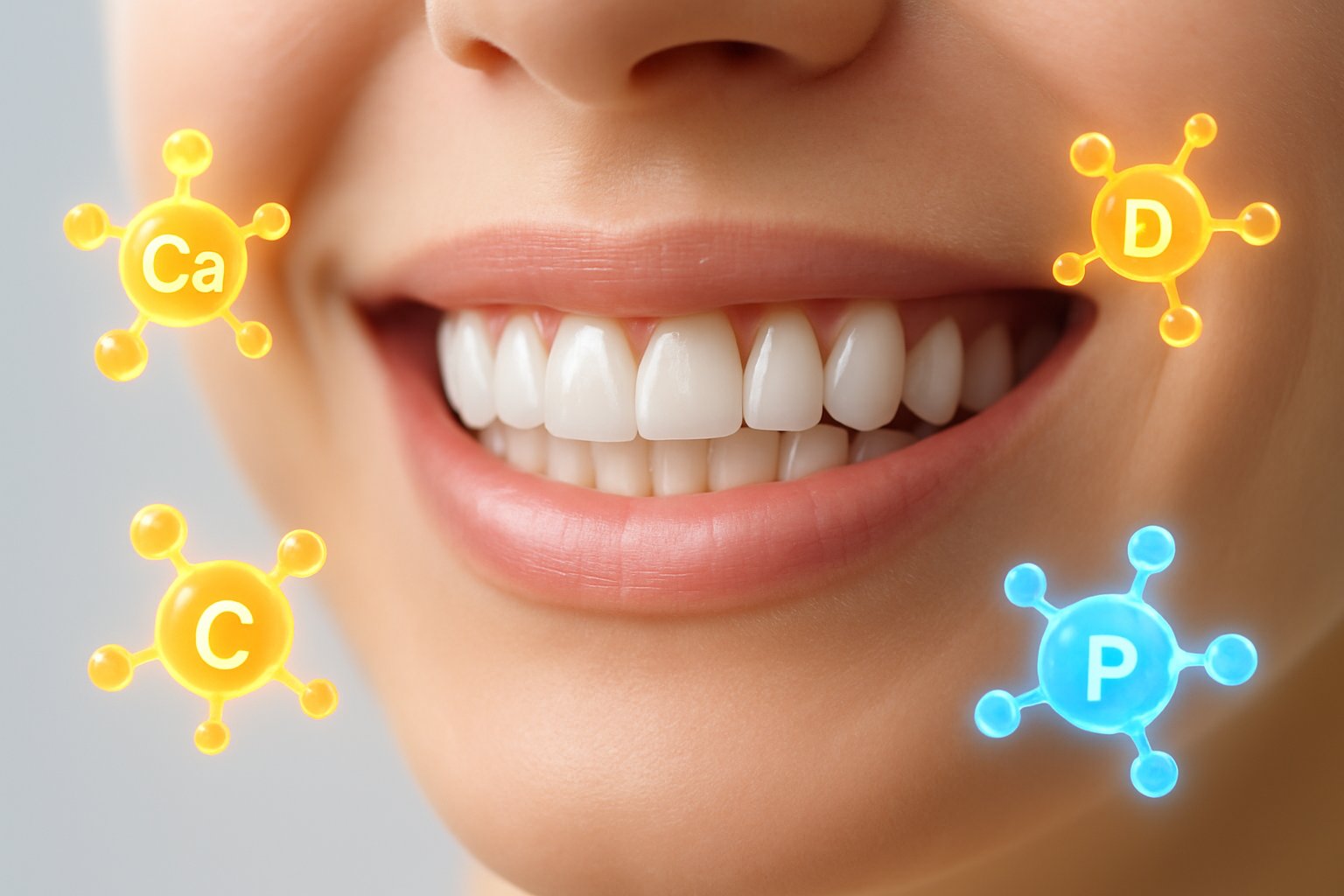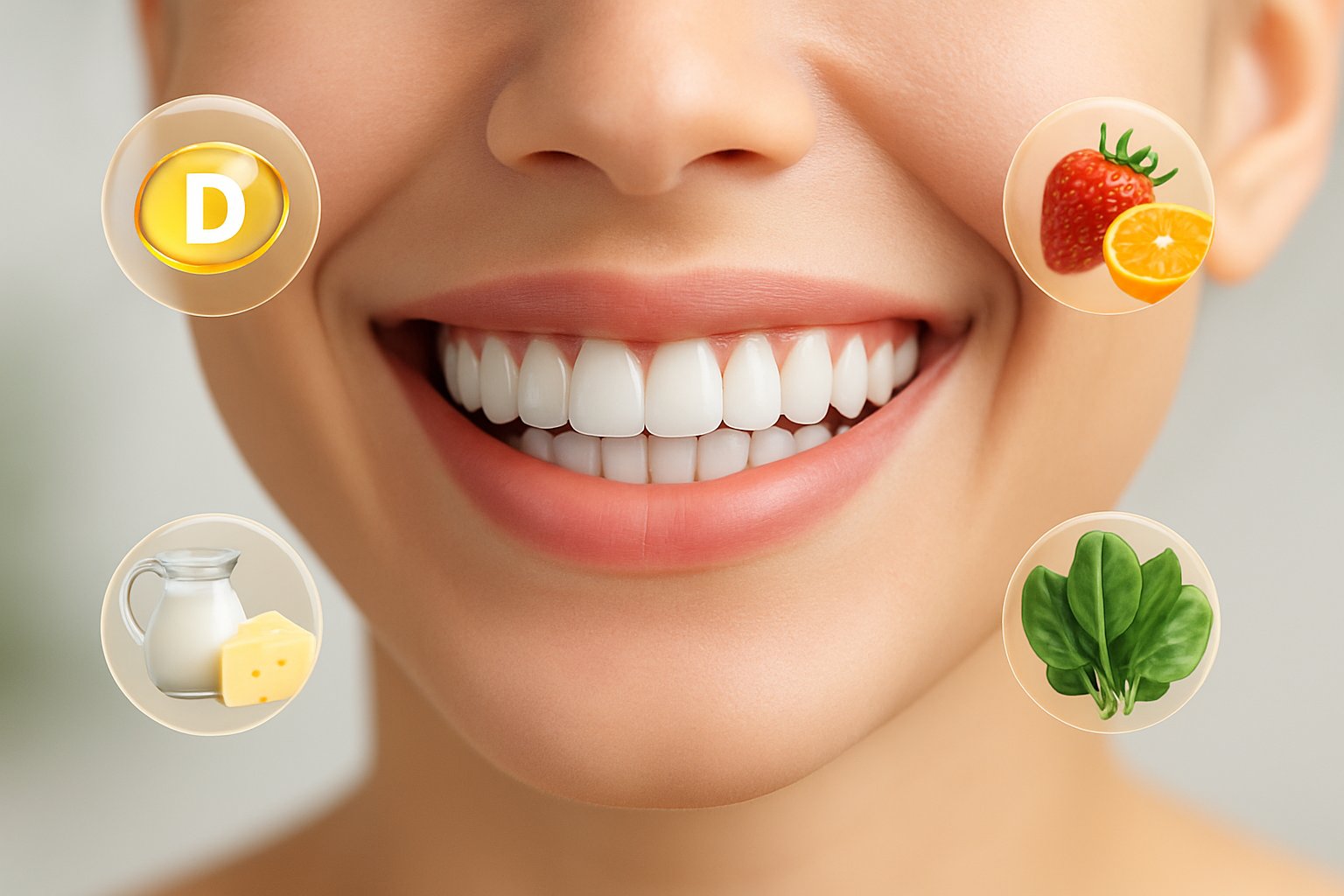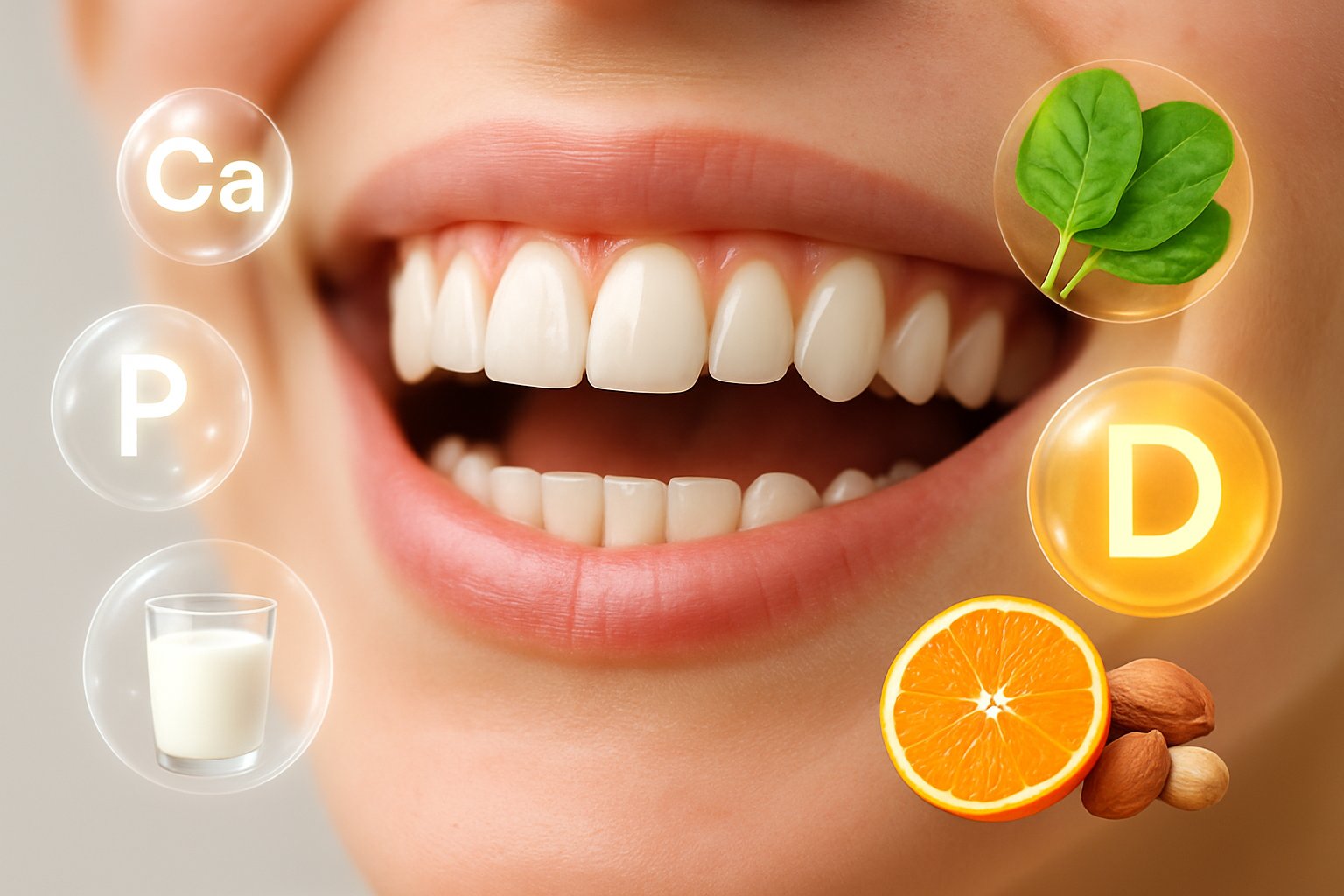How Vitamins And Minerals Affect Your Teeth

Your teeth need more than just brushing and flossing to stay healthy.
The vitamins and minerals we eat directly affect how strong our teeth are and how well our gums fight off disease.
When we don’t get enough of these nutrients, our mouths become more likely to get cavities and gum problems.
Many people don’t realize that what we eat plays a huge role in oral health.
Our teeth are living parts of our body that need specific nutrients to stay strong.
Without the right vitamins and minerals, even good brushing habits might not be enough to keep our mouths healthy.
We can protect our teeth by learning which nutrients matter most.
Some vitamins help our gums heal faster.
Certain minerals make our tooth enamel harder.
Learning about these connections helps us make better food choices for our oral health.
Key Takeaways
- Vitamins and minerals directly strengthen teeth and protect gums from disease
- Specific nutrients like calcium and vitamin D work together to build stronger tooth enamel
- Eating the right foods can prevent cavities and gum problems even with good brushing habits
The Direct Impact of Vitamins and Minerals on Teeth and Gums

Vitamins and minerals work directly on our teeth and gums to build stronger enamel and fight cavities.
These nutrients help prevent common oral diseases like gingivitis and periodontal disease.
How Nutrients Strengthen Tooth Enamel
Our tooth enamel gets stronger when we eat specific vitamins and minerals.
Calcium forms the main building block of enamel.
Without enough calcium, our teeth become weak and break easily.
Phosphorus works with calcium to create hard enamel.
We find phosphorus in foods like fish, eggs, and dairy products.
These two minerals team up to rebuild enamel that acids have damaged.
Vitamin D helps our bodies absorb calcium from food.
Without vitamin D, our bodies cannot use calcium properly.
This vitamin comes from sunlight and foods like fortified milk.
Fluoride makes enamel harder and more resistant to acid attacks.
It repairs tiny holes in enamel before they become cavities.
We get fluoride from toothpaste and treated water supplies.

Role of Vitamins and Minerals in Preventing Tooth Decay
Several nutrients help prevent tooth decay and cavities.
Vitamin C fights harmful bacteria in our mouths and helps repair damaged tooth tissue.
Vitamin A keeps the soft tissues in our mouths healthy, including the tissues that surround our teeth.
Healthy tissues fight off bacteria that cause decay.
Calcium and phosphorus rebuild areas where acid has started to damage enamel.
The minerals fill in weak spots before they become holes.
Vitamin K2 helps move calcium to our teeth where we need it most.
Without K2, calcium might not reach the areas that need repair.
Key decay-fighting nutrients:
- Vitamin C fights bacteria
- Vitamin A protects soft tissues
- Calcium and phosphorus repair damage
- Vitamin K2 directs calcium to teeth
Vitamin and Mineral Influence on Gum Health
Our gums need specific nutrients to stay healthy and fight inflammation.
Vitamin C prevents gingivitis by keeping gum tissue strong.
Without enough vitamin C, our gums bleed and swell.
Vitamin D reduces inflammation in our gums and helps our immune system fight the bacteria that cause gum disease.
Low vitamin D levels link to worse periodontal disease.
Calcium keeps the jawbone strong.
A strong jawbone supports healthy gums and teeth.
Weak jawbones lead to loose teeth and gum problems.
Vitamin E acts as an antioxidant in gum tissue.
It protects our gums from damage caused by bacteria and toxins.
Folate helps repair and maintain gum tissue.
People with low folate often have more severe gum inflammation and periodontal disease.
Essential nutrients for healthy gums:
- Vitamin C – prevents bleeding and swelling
- Vitamin D – fights inflammation
- Calcium – supports jawbone strength
- Vitamin E – protects against damage
- Folate – repairs gum tissue
Essential Vitamins and Their Role in Dental Health

Vitamins play key roles in keeping our teeth and gums healthy.
Vitamin D helps our bodies absorb calcium for strong teeth.
Vitamin C protects our gums from disease and helps build collagen.
Vitamin D and Calcium Absorption
Vitamin D helps our bodies absorb calcium from food.
Without enough vitamin D, our teeth cannot get the calcium they need to stay strong.
When we lack vitamin D, our tooth enamel becomes weak.
This makes our teeth more likely to get cavities and break.
The enamel cannot repair itself properly without good calcium levels.
Key sources of vitamin D:
- Sunlight exposure
- Fatty fish like salmon
- Fortified milk and cereals
- Vitamin D supplements
Our bodies need about 600-800 IU of vitamin D each day.
People who stay indoors often or live in cold climates may need supplements to get enough.
Low vitamin D levels can also cause tooth pain and loose teeth.
Children with vitamin D problems may develop teeth that form incorrectly.
Vitamin C and Gum Protection
Vitamin C helps make collagen, which keeps our gums strong and healthy.
Collagen acts like the framework that holds our gum tissue together.
When we do not get enough vitamin C, our gums become red, swollen, and bleed easily.
This condition is called scurvy in severe cases.
Even mild vitamin C deficiency can cause gum problems.
Our bodies cannot make vitamin C on their own.
We must get it from food or supplements every day.
Foods high in vitamin C:
- Oranges and citrus fruits
- Strawberries
- Bell peppers
- Broccoli
- Tomatoes
Adults need about 75-90 mg of vitamin C daily.
Smokers need even more because smoking destroys vitamin C in the body.
People with gum disease often have low vitamin C levels in their blood.
Vitamin A for Saliva and Mucosal Health
Vitamin A helps our mouths make enough saliva.
Saliva washes away food bits and harmful bacteria that can cause tooth decay.
This vitamin also keeps the soft tissues in our mouths healthy.
The inside of our cheeks, tongue, and gums all need vitamin A to stay strong and fight off infections.
Signs of vitamin A deficiency in the mouth:
- Dry mouth
- White patches on gums
- Slow healing of mouth sores
- Increased tooth decay
We can get vitamin A from orange vegetables like carrots and sweet potatoes.
Dark leafy greens and liver also contain high amounts.
Too little vitamin A makes it hard for our mouths to heal from cuts or dental work.
Our teeth may also become more sensitive to hot and cold foods.
B Vitamins’ Contribution to Oral Tissues
B vitamins work together to keep our mouth tissues healthy.
Vitamin B12 helps prevent mouth sores and keeps our tongue from becoming sore and red.
Other B vitamins help our bodies heal quickly after dental procedures.
They also help prevent cracks at the corners of our mouth.
Important B vitamins for oral health:
- B12 – prevents mouth sores
- B6 – reduces gum inflammation
- Folate – helps tissue repair
- Riboflavin – prevents mouth cracks
People who follow strict plant-based diets often lack B12 since it mainly comes from animal foods.
Vitamin deficiencies in B vitamins can cause burning tongue, mouth ulcers, and bad breath.
A balanced diet with meat, dairy, and whole grains usually provides enough B vitamins.
Some people may need supplements if they have absorption problems.
Minerals Vital for Strong Teeth and Gums

Four key minerals work together to keep our teeth and gums healthy.
Calcium builds tooth structure, phosphorus strengthens enamel, iron supports oral tissues, and potassium maintains bone density.
Calcium’s Role in Tooth Structure
Calcium forms the foundation of our teeth and jawbones.
About 99% of the calcium in our body sits in our bones and teeth.
Our tooth enamel contains more calcium than any other part of our body.
This mineral makes enamel the hardest substance we have.
Daily calcium needs:
- Adults: 1,000-1,200 mg
- Children: 700-1,300 mg
When we don’t get enough calcium, our body takes it from our teeth and bones.
This makes teeth weaker and more likely to break.
Top calcium sources include:
- Dairy products (milk, cheese, yogurt)
- Fortified plant-based milk (soy, almond, oat)
- Canned fish with bones (salmon, sardines)
- Leafy greens
- Nuts and seeds
We absorb calcium better when we eat it with vitamin D.
Our saliva also carries calcium to our teeth throughout the day.
Phosphorus for Enamel Health
Phosphorus works with calcium to build strong tooth enamel.
These two minerals form calcium phosphate crystals that make up most of our tooth structure.
About 85% of our body’s phosphorus lives in our bones and teeth.
This mineral helps repair tiny cracks in enamel before they become cavities.
Our bodies need phosphorus to use calcium properly.
Without enough phosphorus, calcium can’t do its job of strengthening teeth.
Good phosphorus sources:
- Fish (salmon, tuna, cod)
- Dairy products
- Eggs
- Nuts and legumes
- Whole grains
Most people get enough phosphorus from food.
We need about 700 mg per day as adults.
Phosphorus also helps our gums stay healthy.
It supports the tissues that hold our teeth in place.
Iron and Oral Tissue Preservation
Iron keeps our gums and mouth tissues healthy.
This mineral helps carry oxygen to all parts of our mouth through our blood.
Low iron levels can cause pale, swollen gums that bleed easily.
People with iron deficiency often get mouth sores and infections.
Iron also helps fight bacteria in our mouth.
Our immune system needs iron to work properly against harmful germs.
Iron-rich foods include:
- Red meat and poultry
- Fatty fish (salmon, mackerel)
- Beans and legumes
- Spinach and dark leafy greens
- Fortified cereals
Women need 18 mg of iron daily, while men need 8 mg.
Our bodies absorb iron better when we eat it with vitamin C foods.
Iron deficiency can make our tongue smooth and sore.
It may also cause cracks at the corners of our mouth.
Potassium and Bone Density
Potassium helps keep our jawbones strong and dense.
Strong jawbones hold our teeth firmly in place.
This mineral works with calcium to build bone tissue.
Potassium also stops our body from losing too much calcium through urine.
People who eat more potassium have stronger bones overall.
This includes the bones that support our teeth.
Potassium sources:
- Bananas and oranges
- Potatoes and sweet potatoes
- Fish and dairy products
- Beans and legumes
- Avocados
Adults need about 3,500-4,700 mg of potassium each day.
Most people don’t get enough from their diet.
Low potassium levels can lead to bone loss around our teeth.
This makes teeth loose and more likely to fall out.
Optimizing Your Diet for Oral Health
Getting the right nutrients from food sources helps protect our teeth naturally.
We can also use supplements when our diet falls short, but balance remains key for the best results.
Food Sources of Key Vitamins and Minerals
Calcium-rich foods build strong teeth. Dairy products like milk, cheese, and yogurt contain the most calcium per serving.
We also get calcium from fortified plant-based milk. Leafy green vegetables like kale and spinach, and canned fish with bones, are good sources too.
Vitamin D sources help our bodies use calcium. Fatty fish such as salmon, mackerel, and sardines provide high amounts.
Fortified milk and cereals also supply vitamin D.
Phosphorus works with calcium to build tooth enamel. Fish, nuts, legumes, and dairy products all supply phosphorus.
Vitamin C keeps our gums healthy and fights infection. Citrus fruits provide the most vitamin C.
Strawberries, bell peppers, and broccoli also contain vitamin C. Fresh fruits work better than juice because juice can damage teeth with acid and sugar.
Vitamin A maintains healthy gum tissue. Orange vegetables like carrots and sweet potatoes contain beta-carotene, which our bodies turn into vitamin A.
Supplements and Their Effects on Dental Health
Calcium supplements help if we do not get enough from food. Most adults need 1,000-1,200 mg daily.
Taking calcium with vitamin D helps our bodies absorb it better.
Vitamin D supplements are useful in winter or for people who do not eat fatty fish. We need 600-800 IU daily for proper calcium absorption.
Vitamin C supplements may help people with gum disease. Chewable vitamin C tablets can erode tooth enamel if used too often.
Multivitamins fill nutritional gaps but should not replace a balanced diet. We should check with our dentist or doctor before starting new supplements.
Some supplements can cause problems. Iron supplements may stain teeth.
Calcium supplements without magnesium can cause imbalances that affect oral health.
Balanced Diet Strategies for Healthy Mouths
Timing our meals helps tooth health. Eating three main meals instead of frequent snacking gives our teeth time to recover from acid attacks.
Combining foods helps nutrients work better. We should eat calcium-rich foods with vitamin D sources.
Pairing citrus fruits with meals reduces their acid effects on teeth.
Planning weekly meals helps us include all important nutrients. We can aim for fatty fish twice per week.
Dairy products or fortified plant-based milk should be included daily. Nuts or legumes work well several times per week.
Drinking water with meals washes away food particles and bacteria. Water also helps our bodies use nutrients properly.
Limiting processed foods protects our teeth from excess sugar and preservatives. Fresh, whole foods provide more nutrients and cause less tooth damage than packaged foods.
Frequently Asked Questions
Many people want to know which vitamins and minerals protect their teeth and gums. Some also ask how nutrient deficiencies affect oral health and which supplements help strengthen teeth.
What are the essential vitamins for maintaining healthy teeth and gums?
Vitamin C keeps our gums healthy and strong. Without enough vitamin C, gums can bleed and become swollen.
Vitamin D helps our bodies use calcium to build strong teeth. We need vitamin D to absorb calcium from food.
Vitamin A keeps mouth tissues healthy. It helps saliva glands work and protects against infection.
B vitamins prevent mouth sores and gum disease. They help our mouth tissues heal after injury.
Which minerals are crucial for tooth enamel strength?
Calcium makes tooth enamel hard and strong. Teeth need calcium to resist decay.
Phosphorus works with calcium to build tooth structure. Together, these minerals make teeth stronger.
Fluoride helps rebuild weak spots in tooth enamel. It makes teeth more resistant to acid attacks from bacteria.
Magnesium helps our bodies use calcium. Without enough magnesium, our bodies cannot build strong teeth.
How can vitamin deficiencies impact oral health?
Low vitamin C causes scurvy, which makes gums bleed and teeth fall out. Gums become red, swollen, and painful without this vitamin.
Vitamin D deficiency leads to soft, weak teeth that break easily. Children without enough vitamin D can develop crooked or delayed teeth.
Vitamin A deficiency reduces saliva production. This leads to dry mouth and higher risk of tooth decay and gum disease.
B vitamin deficiencies cause mouth sores and cracked lips. The tongue may become red and painful without enough B vitamins.
What supplements can adults take for stronger teeth?
Calcium supplements help adults who do not get enough from food. Most adults need 1000-1200 mg per day.
Vitamin D3 supplements improve calcium absorption. Most adults need 800-1000 IU of vitamin D daily.
Magnesium supplements help the body use calcium. Adults typically need 300-400 mg of magnesium each day.
Vitamin C supplements prevent gum disease. Adults should get 65-90 mg of vitamin C daily for healthy gums.
Are there specific nutrients recommended for preventing tooth decay?
Fluoride is the most important nutrient for preventing cavities. It strengthens tooth enamel and stops decay from spreading.
Calcium creates strong teeth that resist acid attacks. Foods rich in calcium help rebuild tooth enamel.
Phosphorus works with calcium to keep teeth hard. Meat, fish, and dairy products provide both minerals.
Xylitol, a natural sugar substitute, reduces harmful bacteria in the mouth. It helps prevent new cavities from forming.
Can taking vitamins improve the health of teeth and gums in children?
Children need vitamin D for proper tooth development. If children do not get enough vitamin D, their permanent teeth may grow in crooked or weak.
Calcium supplements help children build strong adult teeth. Children need 1000-1300 mg of calcium each day as they grow.
Vitamin C helps prevent gum problems in children. Kids with enough vitamin C have healthier gums.
Fluoride supplements protect children’s teeth if their water does not contain fluoride. Dentists can decide if children need fluoride drops or tablets.
📞 Contact Kaufman Dentistry Today
Give us a call at (310) 838-7780 to schedule your appointment and take the first step towards a stunning smile.
You can find us at 10760 Washington Blvd., Culver City, CA 90232. We look forward to welcoming you to our practice and helping you achieve the smile of your dreams!
